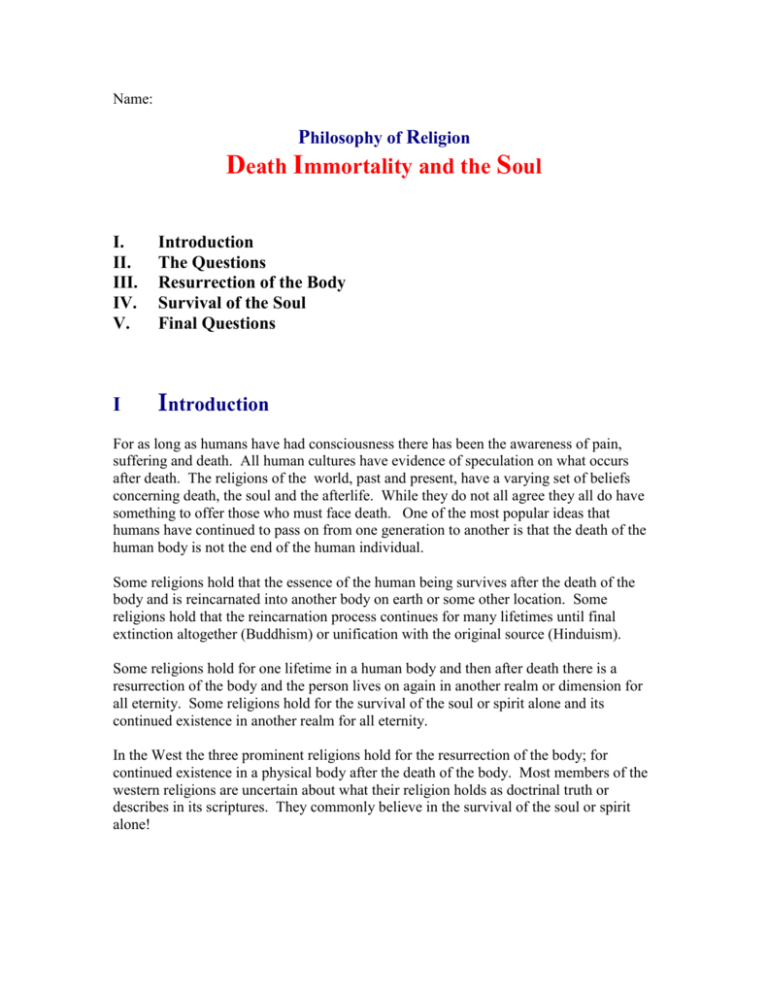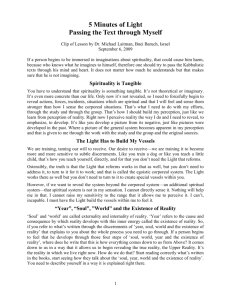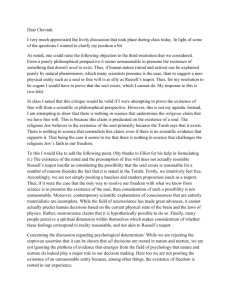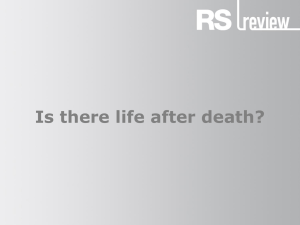Death, Spirit, Souls, Resurrection
advertisement

Name: Philosophy of Religion Death Immortality and the Soul I. II. III. IV. V. Introduction The Questions Resurrection of the Body Survival of the Soul Final Questions I Introduction For as long as humans have had consciousness there has been the awareness of pain, suffering and death. All human cultures have evidence of speculation on what occurs after death. The religions of the world, past and present, have a varying set of beliefs concerning death, the soul and the afterlife. While they do not all agree they all do have something to offer those who must face death. One of the most popular ideas that humans have continued to pass on from one generation to another is that the death of the human body is not the end of the human individual. Some religions hold that the essence of the human being survives after the death of the body and is reincarnated into another body on earth or some other location. Some religions hold that the reincarnation process continues for many lifetimes until final extinction altogether (Buddhism) or unification with the original source (Hinduism). Some religions hold for one lifetime in a human body and then after death there is a resurrection of the body and the person lives on again in another realm or dimension for all eternity. Some religions hold for the survival of the soul or spirit alone and its continued existence in another realm for all eternity. In the West the three prominent religions hold for the resurrection of the body; for continued existence in a physical body after the death of the body. Most members of the western religions are uncertain about what their religion holds as doctrinal truth or describes in its scriptures. They commonly believe in the survival of the soul or spirit alone! II . The Questions Here are some of the questions raised by the most common beliefs concerning the afterlife. Will we survive in any way? As a soul or spirit? Do souls exist? How do we know? What evidence is there for the existence of the soul or spirit that can live apart from the body? What evidence is there for the survival of the soul or spirit? Will we get our bodies back? If so, which one? What will life in the hereafter be like? II. Resurrection of the Body Many people do not give much reflection to the exact details of their view of an afterlife. Most give little consideration to the issue of whether or not they will have a body for the afterlife and if so, exactly what body will each person have for all eternity? It appears that based on scriptural passages the members of the western religions should hold for the resurrection of their bodies. How exactly that is to work is a matter of critical concern. The survival of the soul and its unification with the body are matters concerning which philosophers have had a variety of views. III. Survival of the Soul While most religions and cultures hold for the existence of a soul or spirit, philosophers have had a variety of views on the matter and some of those views deny the existence of the non physical entity altogether. Plato Plato thought that the soul could and would exist apart from the body and would exist after the death of the body. He offered a “proof” for this position and was the first to do so in writing that we have any evidence of doing so. He held that humans were composed of bodies and souls but the soul was more important and immortal. His argument used a premise which we question today. Plato thought that he could conclude that the soul could exist independent of the body because it acted independently from the body when it engaged in pure thought. This is no longer accepted as true since it is equally evident today that without a physical brain thought appears unlikely to occur. Descartes also believed that the soul existed prior to and separate from the body and so was immortal. David Hume held a variety of objections to the belief in a soul. It was only based upon divine revelation through scripture that he maintained his belief. Arguments against the existence of the soul 1. Metaphysical argument No evidence of the soul as a separate , distinct substance If it did exist it would be ingenerable and would exist before the body 2. Moral argument Justice of God would be called into question because of the eternal nature of the rewards and punishment 3. Physical Argument No evidence of survival Much evidence of decay-alterations, dissolution Bertrand Russell Argued against the existence of the soul Can not prove that the person will survive after death but it is unlikely for the mind is associated with the brain and it deteriorates and dissolves after death. Emotions cause a belief in immortality 1. people fear death 2. people need courage 3. people admire excellence in others and don’t want to loose them to death John Hick He regards the human as a psychophysical person. This person shall be resurrected through a divine act of recreation. Humans will have a spiritual body. To demonstrate the possibility of this event Hick conducts a thought experiment. Consider John Smith: 1. he disappears and then reappears somewhere else , e.g., Calcutta, India 2. he dies and reappears on earth. 3. he dies and is recreated in another world-the afterlife Would he , John Smith #2 still be John Smith? Would he, John Smith #2 be accepted as John Smith? Heaven and hell exist as the other worlds in which the spiritual bodies exist. There may be evidence of the existence of a non-physical component of the person: Parapsychology reports: ESP, telepathy- evidence of the existence of a soul?? OTHER EVIDENCE supporting the Post Mortem Survival Hypothesis: 1. Apparitions 2. Seances 3. Reincarnation Memories 4. Out of Body Experiences- OOBE Near Death Experiences - NDE 5. Death Bed Observations Hick concludes it is not irrational(illogical) to believe in the survival of the spirit or the self. Personal survival is a necessary condition for immortality Anthony Flew Professor Flew is opposed to the idea of personal survival. He reviews three different views: 1. Platonic/ Cartesian Dualism- this is incoherent because the idea of an incorporeal being is incoherent. Personality is related to corporeal existence. 2. Astral Body- this is logically possible but too farfetched and uneccessary There is no need for this hypothesis. 3. Reconstituted Body- Recreated by God for the afterlife This is not really the same body. This being would not be the same person. There would be a discontinuity. This is a replica of the person and not the person who was once alive on earth. Jeffrey Olen A Functionalist view of Personal Identity Life after death is possible as long as personality and memories remain intact. Person is not the same as a human being PERSON =|= HUMAN BEING Human being: intelligence, consciousness, moral responsibilities, rights, language etc.. Criteria for Identity: Body- brain with memory Criteria for Person: Consciousness- a conscious being Personal Identity is not sameness of consciousness / body A. Psychological States-Consciousness 1. relies on memory-this is faulty 2. memories can be duplicated and placed in another 3. memories can not exist apart from the body-brain B. Body-Brain identity 1. body changes over time 2. brain cells can be duplicated Personal identity and personhood can not be identified with either contiuity of consciousness or continuity of the physical brain!! Continuity of consciousness is possible with different bodies. A consciousness can be programmed / transferred Do not identify personhood with sameness of stuff(brain) , but the sameness of consciousness! The sameness of functionality is the essential feature of the person and identity. Personhood is located in the functionality of the brain. Olen accepts a materialist view of the personality. Olen accepts that the functioning of the person can be transferred or recreated in another physical entity, e.g. body/brain or computer or alien body!! Peter van Inwagen Inwagen argues against the Aristotelian view of the person/body. He does not believe that the all powerful being collects the atoms of the dead person’s body and reassembles them after death in another realm. This would be a recreation and a replica but not the same person. Instead he argues : It is possible for the all powerful creator and Supreme Being to restore an individual to life in the same body. The deity could at least preserve the brain in a new body replacing it with a replica. The all powerful being could replace the actual dead body with a duplicate, a replica, instantaneously at the exact moment of death!!! IV. Final Questions After all the reflections on this topic these questions remain: 1. Is there conclusive evidence to indicate that there is the existence of a soul or spirit that can exist separate from the physical body? 2. Is there conclusive evidence that the spirit or soul or “self” continues to exist after the death of the body? 3. Is there conclusive reasoning that the survival of the person is possible? 4. Is there any evidence or conclusive reasoning on the nature of the afterlife?






